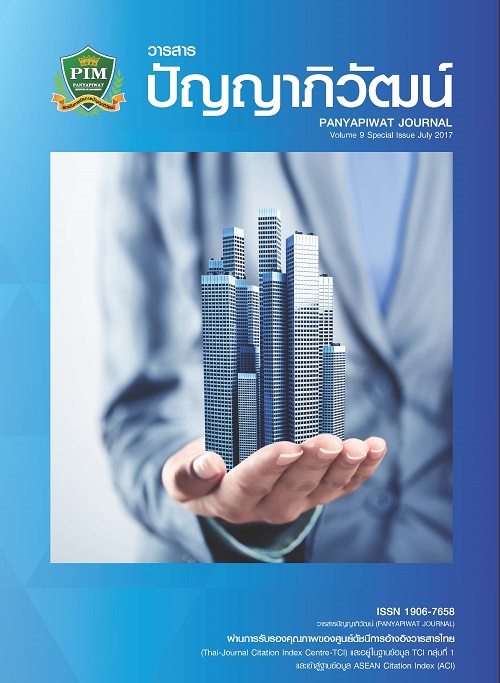การประเมินโครงการสอนภาษาจีนในโรงเรียนสังกัดกรุงเทพมหานคร: กรณีศึกษาโรงเรียนมัธยมบ้านบางกะปิ
Main Article Content
บทคัดย่อ
การศึกษานี้มีวัตถุประสงค์เพื่อประเมินโครงการสอนภาษาจีนในโรงเรียนสังกัดกรุงเทพมหานคร ตาม CIPPI Model ใน 5 ด้าน คือ ด้านบริบท ด้านปัจจัยนำเข้า ด้านกระบวนการ ด้านผลผลิต และด้านผลกระทบ โดยใช้วิธีการวิจัยเชิงคุณภาพ ผลการศึกษาพบว่า ด้านบริบท มีการกำหนดวัตถุประสงค์ของโครงการได้อย่างเหมาะสม ตอบสนองต่อความจำเป็นและความต้องการของหน่วยงานที่เกี่ยวข้อง และสอดคล้องกับนโยบายของต้นสังกัด ด้านปัจจัยนำเข้า ครูสอนภาษาจีนที่มีคุณภาพและเพียงพอกับความต้องการของโรงเรียน งบประมาณมีความเหมาะสมและเพียงพอ และสื่อการเรียนการสอนไม่เหมาะสมกับพื้นฐานของนักเรียน ด้านกระบวนการ ครูสอนภาษาจีนจัดการเรียนการสอนได้เหมาะสมและมีวิธีการประเมินผลที่หลากหลาย ด้านผลผลิต นักเรียนมีความรู้ความเข้าใจ ทักษะการใช้ภาษาจีนมากขึ้น และมีทัศนคติที่ดีต่อภาษาจีนมากขึ้น และ ด้านผลกระทบ นักเรียนได้นำความรู้ที่ได้ไปใช้ให้เกิดประโยชน์กับตัวเองและสร้างชื่อเสียงให้กับโรงเรียน
The objective of this study is to evaluate the Chinese Teaching Project in Schools Under the Jurisdiction of Bangkok Metropolitan Administration: A Case Study of Ban Bangkapi Secondary School, following the CIPPI Model in 5 aspects: context, input, process, product and impact. By using a qualitative research method, the result is found in the context that the project objectives are suitable and reflect to the need and demand of related institutions and the policy of Bangkok Metropolitan Administration. In the input aspect, the Chinese teachers have good quality and are sufficient with the demand of a school, the budget is appropriate and enough but learning media do not match with the student background. In the process aspect, the Chinese teachers can teach the lesson suitably and use various evaluation methods. In the product aspect, the students have knowledge and understand how to use a Chinese language better, and have good attitude toward a Chinese language. In the impact aspect, the students use their gained knowledge for their advantages and the school’s prestige.
Article Details
“ข้าพเจ้าและผู้เขียนร่วม (ถ้ามี) ขอรับรองว่า บทความที่เสนอมานี้ยังไม่เคยได้รับการตีพิมพ์และไม่ได้อยู่ระหว่างกระบวนการพิจารณาลงตีพิมพ์ในวารสารหรือแหล่งเผยแพร่อื่นใด ข้าพเจ้าและผู้เขียนร่วมยอมรับหลักเกณฑ์การพิจารณาต้นฉบับ ทั้งยินยอมให้กองบรรณาธิการมีสิทธิ์พิจารณาและตรวจแก้ต้นฉบับได้ตามที่เห็นสมควร พร้อมนี้ขอมอบลิขสิทธิ์บทความที่ได้รับการตีพิมพ์ให้แก่สถาบันการจัดการปัญญาภิวัฒน์หากมีการฟ้องร้องเรื่องการละเมิดลิขสิทธิ์เกี่ยวกับภาพ กราฟ ข้อความส่วนใดส่วนหนึ่งและ/หรือข้อคิดเห็นที่ปรากฏในบทความข้าพเจ้าและผู้เขียนร่วมยินยอมรับผิดชอบแต่เพียงฝ่ายเดียว”
เอกสารอ้างอิง
Buosonte, R. (2013). CIPP and CIPPIEST evaluation model: mistaken and precise concept of application.Silpakorn Education Research Journal, 5(2), 23-24. [in Thai]
Chantarattana, W. (2012). An evaluation of an instruction and study project in the form of special classrooms at educational institutions under the jurisdiction of secondary education service area office 8. Master of Education Thesis, Ramkhamheang University. [in Thai]
Chantavanich, A. et al. (2002). The School perfection. Information center, Ministry of Education. [in Thai]
Chareonwongsak, K. (2012). Foreign language skills required for globalization. Retrieved March 15, 2016, from http://www.kriengsak.com/node/161 [in Thai]
Doolar, Y. K., Tolu, A. T. & Doyran, F. (2014). Evaluating a Graduate Program of English Language Teacher Education. Turkish Online Journal of Qualitative Inquiry, 5(2), 1-10.
Gwynne-Atwater, A. (2011). An Evaluation of a Special Education Preschool Program Serving Children with Autism or Autistic-Like Behaviors. Falls Church, Virginia.
Hinds, D. S. W. (2013). Evaluating Alternative High Schools: Program Evaluation in Action. Portland State University.
Imcheen, K. (2012). An evaluation of moral and ethics project of Bangborwittayakom school in Samutprakan province under the secondary educational service area office 6. Master of Education Thesis, Burapha University. [in Thai]
Kwuanphet, B. (2014). Evaluation of academic development of the students at the end. School District 5 (head outside the fortress) Songkhla Municipality, Songkhla. Research Report. [in Thai]
Plairaharn, C. (2012). An evaluation of the encouraging student to gain reading habit project of schools in Amphoe Khaukhitchakut under the Chantaburi primary education service area office 2. Master of Education Thesis, Burapha University. [in Thai]
Quinn, J. D. (2014). A Program Evaluation of the Impact of a “Read to Learn” Model on Alternative High School Students’ Lexile Levels and Reading Achievements. Gardner-Webb University.
Raksakeaw, P. (2011). An evaluation of the program for developing gifted students in science mathematics technology and languages with the participatory evaluation model: case study of Mathavajiravudh changwat songkhla school under the patronage of her royal highness H.R.S. Princess Bajaratana. Master of Educational in Research and Evaluation Thesis, Thaksin University. [in Thai]
Sararatana, W. (2011). Research Executive Education: Concepts and Case Studies. Bangkok: Aksarapipat.
Sereewat, W. (2012). A systematic evaluation of world – class standard school project. Doctor of Philosophy in Educational Administration Thesis, Khon Kaen University. [in Thai]
Sinlapavirot, K. (2014). Evaluation of the preparations student’ readiness to take the entrance examination to public universities, Chiang Mai Thepbodint school. Master of Education Thesis, Chiang Mai University. [in Thai]
Songkrod, W. (2014). The project to develop the student’s ability to think. Han Ban Siri Administrative offenses. Research Report. [in Thai]
Wangkem, P. (2011). Evaluation of Buddhist - way schools in Songkhla primary service area 3. Master of Education in measurement of Education Thesis, Thaksin University. [in Thai]
Yuangyai, S. (2012). The evaluation of pre – promotion project for teachers and educational personnel of the office of the basic education commission. Master of Education Program in Development Education Thesis, Silpakorn University. [in Thai]


